L'académie du cigare, All about cigars
Padrón brand history
With around 6 million cigars produced each year, Padrón is one of the least prolific premium cigar manufacturers in the industry. Nevertheless, its cigars are celebrated by aficionados the world over. From Cuba to Nicaragua, by way of Miami and Honduras, this family-run business has undergone many changes and has succeeded in establishing itself in the world of premium cigars. Today, Padrón is synonymous with luxury, consistency and exemplary quality.
The roots of Padrón Cigars
The story of the Padrón heritage begins in the mid-19th century, when Damaso Padrón, a young boy born in the Canary Islands, emigrated to Cuba. As soon as he arrived, he began working in the tobacco fields of Pinar del Rio. After several years of hard work, he managed to buy a small farm, where he settled with his sons. Together, they planted tobacco and sold it for $0.15 a kilo. With this income, they bought other tobacco farms and acquired a factory in the Piloto region. This is the origin of "Piloto Cigars", the name of Padrón Cigars' parent company.
Jose Orlando Padrón, le petit-son of Damaso and founder of Padrón Cigars, was born in 1926. He spent his childhood in the Pinar del Rio region, alongside his father Francisco and grandfather, who passed on to him their passion for tobacco. In 1944, after graduating from the José B. Alemán Industrial Technical School, Jose returned to work in the tobacco industry. Alemán Industrial Technical School, Jose returned to work on his father's 90-hectare farm. There, he supervised plant cultivation and leaf sorting.
In the early 1950s, he became manager of a copper mine in the Pinar del Rio region. After the mine was closed due to political unrest in the region, he joined Fidel Castro's underground army. But in January 1959, after Castro's accession to power, he decided to leave the ranks of the Revolutionary Army. He left Cuba for Spain in April 1961, eight months after the Castro government nationalized the land.
The birth of Padrón Cigars
In December 1961, after several months in Madrid, Jose Orlando boarded the steamship Covadonga bound for New York. In February 1962, he settled in Miami, home to a large population of Cuban exiles. After several months of struggling to survive on government aid to Cuban refugees, he finally got a job as a gardener. One of his friends, Raul Fernández, also gave him a hammer, which enabled him to do some carpentry work. Thanks to this night job, he was able to put aside $600 to realize his dream of opening a cigar-making business. Jose had noticed that quality cigars were hard to come by since the American embargo. He wanted to remedy this problem by creating his own brand of cigars. In September 1964, Padrón Cigars was born.
Over the next few years, he continued to work as a gardener and carpenter, while expanding his cigar factory. He hired a torcedor who produced around 200 cigars a day. In the evenings, when his working hours were over, he sold his cigars in various Miami stores. The idea was to offer premium cigars made using the same traditional craftsmanship as habanos. Despite a rocky start, Padrón cigars eventually gained notoriety after Jose asked his torcedor to roll them with a pigtail. Called "fuma", these cigars were made from long-filler tobaccos grown in the Connecticut Valley, Puerto Rico and Brazil.
From the outset, Padrón Cigars has distinguished itself by focusing exclusively on quality, not quantity. This is still the Padrón trademark today.
Discovering new terroirs
In the late 60s, Jose was asked by a representative of a Nicaraguan tobacco company to visit plantations in Nicaragua. As soon as he arrived, Jose noticed that Nicaraguan tobacco leaves bore a striking resemblance to Cuban tobacco leaves. Located in north-west Nicaragua, the Esteli region has a micro-climate and soil quality similar to those of Pinar del Rio. Seduced by the quality of these leaves, he began using Nicaraguan tobacco for his production. In 1970, he bought a hundred hectares of land in the Esteli region.
But at the same time, the Sandinista Revolution was destabilizing the entire country, and in 1978, the Padrón factory was burnt down. Reconstruction began almost immediately, but the political situation in the country and the American embargo imposed in 1985 prevented the resumption of stable activity. A few days before the embargo came into force, Jose moved a large part of his production to Honduras, and had to wait until 1990, with the election of the opposition National Union candidate, before being able to resume business in Nicaragua. In 2003, a new Padrón factory was opened in Esteli.
Padrón cigars
Today, the Padrón family owns no less than 17 infrastructures in Nicaragua and many hectares of land. It produces 6 million cigars a year and holds a stock of around 25 million cigars. The brand has five cigar lines: PadrónSeries Classic, Padrón 1964 Anniversary Series, Padrón 1926 Anniversary Series, Padrón Family Reserve and Padrón Dàmaso. These cigars are distinguished by the quality of their manufacture and by their tasty, well-balanced aromatic profile.
Four of these cigars have been named "Cigar of the Year" by Cigar Aficionado magazine. They are the Padr ó n Serie 1926 40th Anniversary (2004), the Padr ó n Serie 1926 No. 9 (2007), the Padr ó n Family Reserve No. 45 Maduro (2009) and the Padr ó n 1964 Anniversary Series Torpedo (2021). Padrón modules also feature every year in the list of the year's 25 best cigars.
A family legacy
When Jose Orlando Padrón died in December 2017, his son Jorge took over the reins of the company. With the help of his many brothers, sisters and cousins, he is carrying on the family tradition with quality and consistency as a point of honor. Today, the company employs over 600 people in factories in Honduras and Nicaragua. Its head office is still in Little Havana, at the same address that served as Jose Padrón's shop window in 1964. The brand covers the entire production process, from plant cultivation to distribution, rolling and aging.
On the Padrón website, Jorge Padrón explains that his father's hammer has a deep meaning for the Padrón family. It represents "the dedication and hard work required to build Padrón Cigars" and is synonymous with "tenacity, integrity, perseverance, loyalty, commitment to quality... and much more". The story of the "martillito" is told to each generation of the family, so that they never forget their humble origins. The story of a man whose sole ambition was to make cigars he found to his liking.

